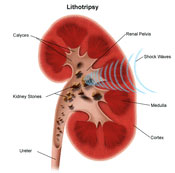Overview
What Are Kidney Stones?

Kidney stones (also called nephrolithiasis, urolithiasis or calculi) are small, hard mineral deposits that form inside your kidney. They may affect any part of your urinary tract system.
If the kidney stone moves or blocks part of the urinary tract system, it can cause severe pain. Most kidney stones will naturally pass from the body without surgery. But if you feel constant pain, cannot pass urine, or get an infection, you may need help to remove the kidney stone.
Sometimes, the stone is too big to pass from the body. In this case, you will need surgery to remove it.
Types of Kidney Stones
There are many different types of kidney stones.
Calcium Stones
Calcium oxalate, apatite, calcium phosphate or brushite are the most common type of kidney stones. More than 3 out of 4 kidney stones are calcium stones. These stones can form because of:
- Not drinking enough fluids
- Not eating the right foods
- Problems in the way your kidneys filter or regulate your body’s pH
- Bowel disorders
- Hyperparathyroidism
- Genetic abnormalities
Uric Acid Stones
These are the second most common type of kidney stones. You cannot see these stones on regular X-rays. You can only see them on a computed tomography (CT) scan or, if they are large, you could see them with an ultrasound. These stones are linked with diet and diabetes.
Struvite Stones
These stones are caused by bacteria from a urinary tract infection.
Cystine Stones
A rare genetic disorder called cystinuria can cause these stones. Cystinuria causes you to release many amino acids in the urine. This leads to kidney stones.
Drug-Induced Stones
Certain medications can cause this type of kidney stones.
Who Can Get Kidney Stones
Nearly 1 in 10 people can have kidney stones. Some people have no symptoms. Some have very painful symptoms that need emergency care. The National Institute of Diabetes and Digestive and Kidney Diseases (NIDDK) estimates that about 1 million people in the United States get treated for kidney stones each year.
According to the NIDDK:
- White people have a higher risk of kidney stones than Black people.
- Although kidney stones happen more in men, a growing number of women are getting them.
- Kidney stones most often affect people between age 20 and 40, but they can affect people of any age.
- If you have had more than one kidney stone, you are more likely to get more.
- If you have a kidney stone and a family history of stone disease, you are more likely to get more stones.


